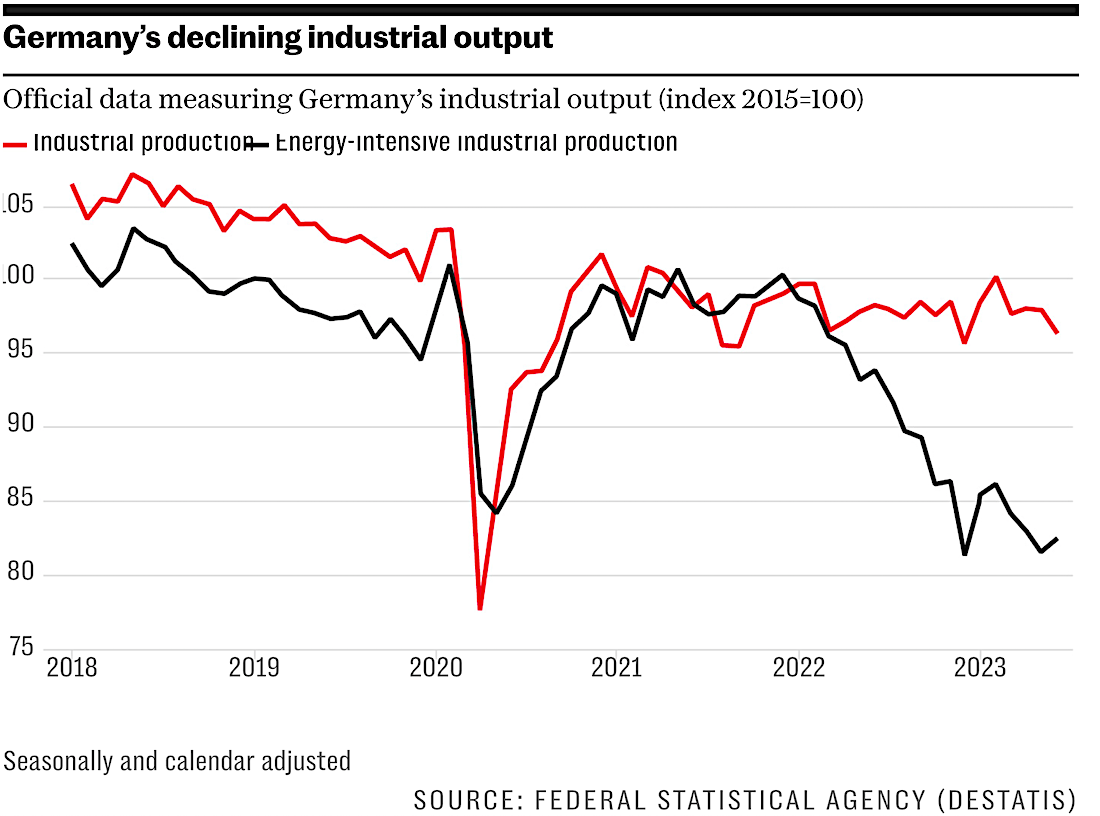Destroying the German economy isn’t easy, but that country’s government is working hard at it. Since the Industrial Revolution, it has been hard to imagine a de-industrialized Germany. But that is the way things are trending.
The London Times reports:
Germany is in the teeth of a “severe and sustained downtrend”, experts warned after a closely watched survey showed that a deep contraction in factory output was keeping its economy under water.
***
Germany’s historically vital manufacturing sector has stalled amid a slowdown in global export demand and a sharp rise in energy prices. Its underperformance has increased the risk of Europe’s economic growth engine slipping back into recession and dragging the rest of the bloc with it.
Liberal outlets like the Times don’t like to mention the fact, but that “sharp rise in energy prices” is due to the fact that Germany has gone “green,” investing countless billions in wind and solar energy while shutting down its nuclear power plants, and in the meantime relying on Russian natural gas. That strategy is yielding economic catastrophe.
The OECD forecast this week that the German economy would contract 0.2 per cent this year, the worst reading in the G7.
In the Telegraph, Matthew Lynn has a blunter assessment:
Germany’s establishment has proved incapable of identifying the key cause of its country’s underperformance: its own disastrous decision-making and political culture. Until it does so, the country will be incapable of the radical reform it desperately needs.
The country’s fortunes have been parallelled by Deutsche Bank, which is now a shadow of its former self. Its market value is roughly 70pc below its 2007 peak, and it is now worth only a third as much as France’s BNP Paribas.
The heart of the problem is Germany’s manufacturing sector, and the source of that problem is energy policy:
The war in Ukraine meant that the Russian gas had to be turned off, and given the ridiculously self indulgent decision to close its nuclear plants Germany only managed to avoid blackouts by paying eyewatering prices for energy on the global market.
Factories are already closing because they can’t afford power.
This chart tells the story: German manufacturing is in decline, but the real decline is in energy-intensive industry:

Germany’s ruling elite is the ultimate cause of the country’s decay:
For all his faults, and his outsized ego, France’s President Macron has made significant pro-business moves, cut some corporate taxes, and slightly trimmed its bloated welfare state.
Italy’s Giorgia Meloni is at least attempting to reform Italy’s stagnant economy. Poland’s economy is easily beating its neighbour, and stealing a lot of its factories into the bargain.
By contrast, Germany is paralysed by a coalition comprising the Social Democrats, the Greens, and the Free Democrats that can agree on almost nothing….
The coalition’s one big idea was splurging €10bn on getting Intel to build a new chip factory in the country in an attempt to drag Germany into the 21st century.
Given the coming glut of semiconductors on the global market, it already looks like a white elephant. Otherwise, Chancellor Scholz’s coalition appears to have no clue how to fix the mess.
Jettisoning “green” energy, reopening nuclear power plants and finding a better source of natural gas–like the U.S.–would be a good start.
Notice: All comments are subject to moderation. Our comments are intended to be a forum for civil discourse bearing on the subject under discussion. Commenters who stray beyond the bounds of civility or employ what we deem gratuitous vulgarity in a comment — including, but not limited to, “s***,” “f***,” “a*******,” or one of their many variants — will be banned without further notice in the sole discretion of the site moderator.